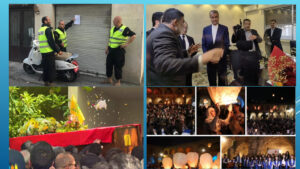Co-writer: Tal Beeri
Introduction:
Against the background of the negotiations between Iran and the world powers regarding the nuclear issue and the fear that billions of dollars transferred to the Iranians will be channeled to the intelligence and terrorist activities of their proxies, there is concern about the nature and scope of Iran’s activity in Europe. Already today, the radical Shiite axis led by Iran in Europe performs an extensive activity of this nature. This activity is based on civilian infrastructures, such as associations and religious centers. These infrastructures are a potential platform for terrorist activity on European soil.
Iran conducts these activities through a single, cross-border community to which Shi’ites supporting its radical ideology belong. Its target audience is Shiites in general, and sometimes even Sunnis are pinpointed as those who can be influenced to behave according to Iranian ideology. The common intent of all Iran’s allies and proxies is to advocate and aspire to implement the export of the radical Shi’ite Islamic revolution worldwide. All the activity appears to be conducted under a large umbrella organization called Ahlul Bayt, which was established by Iran’s Supreme Leader Khamenei in 1990.
(See the special report we published on the subject in June 2021)
Iran’s extensive European activity has not skipped over the Scandinavian countries either. Iranian activity in the Scandinavian countries can be divided into four main issues:
1. Espionage and use of research equipment for military projects
2. Hostile activities
3. Fundraising mechanisms
4. Recruitment of volunteers and religious centers
In recent years, Iran’s mechanisms of operation in European countries, including the Scandinavian countries, have increased and were based on the arrayed network of Iranian intelligence services.
This current special report details the nature and history of Iranian and Hezbollah activity in Scandinavian countries and how local authorities deal with them. In the coming years, the security services in these countries are expected to increase their enforcement regarding the espionage and terrorism activities of Iran and its proxies (possibly even with external assistance); however, it is not clear how these intelligence services will succeed in mapping the long-term threats to their countries, especially in light of the flow of Iranian funds and the Iranians’ concealed modus operandi.
Espionage and use of research equipment for military projects
In recent years, the Iranians have been using researchers with Iranian ties or researchers of Iranian origin to break the cycle of sanctions regarding research equipment that can be used to contribute to their military projects in general and their nuclear project in particular. The latest Swedish intelligence annual report accuses Iran of attempting to gain access to Swedish nuclear weapons technology in recent years. For the most part, the nature of the Iranian espionage is aimed at the Swedish high-tech industry and products that can be used for Iran’s nuclear project. The intelligence report noted that Iranian intelligence officers in Sweden operate under diplomatic cover.[1]
Alongside this, Iranian intelligence also operates by directing Iranians living in Sweden to conduct espionage activities. Among other things, they receive espionage and information-gathering methods training from agents operating under diplomatic cover in Sweden. Sweden recently prosecuted two Iranian-Swedish brothers, Pyman Kia and Fayam Kia, who were arrested in 2021, charging them with espionage for Iranian intelligence organizations. The two brothers, born in Iran and immigrated to Sweden as children in 1994, were accused of espionage from March 2011 until their arrest in September and November 2021. They are currently being held in strict solitary confinement in Kronoberg Prison. The older brother worked as an investigator for the Swedish Intelligence Service (SÄPO – Säkerhetspolisen) and the Military Intelligence and Security Service (KSI – Kontoret för särskild inhämtning), one of the most secretive agencies in Sweden. The younger brother also worked for a short time in SÄPO.
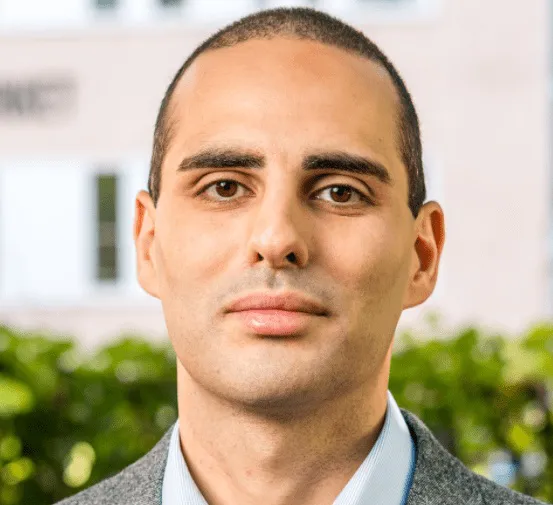
Another Iranian espionage initiative was revealed in Norway. A former professor (whose identity was banned from publication) at the Norwegian University of Science and Technology (NTNU) was accused of inviting four Iranians as visiting researchers without informing the university administration. According to the indictment filed in Norway, the professor, who is of Iranian descent and has German citizenship, made sure that the visiting Iranian researchers had access to laboratories containing, among other things, a Scanning Electron Microscope (SEM), which is on the list of equipment and materials that are prohibited from being exported to Iran as a result of international sanctions. Training Iranians to use this equipment is also prohibited by sanctions. The professor also attempted to install TeamViewer software that allows remote access to a computer on one of the computers in the nanomechanical laboratory. The computer was connected to a device called EBSD, which is additional equipment for the SEM. According to the plan, one of the Iranian researchers was going to extract the information stored remotely. According to the Norwegians, if the plan had succeeded, it would have been used to develop Iran’s military capability. The key issue is whether research on specific metal alloys has provided Iran with information that may be important in producing weapons of mass destruction or their means of delivery.
This activity is not unique. In recent years, the Norwegian intelligence services have discovered that Iranian researchers have received high grades from Iran’s research institutions, entitling them to be accepted to prestigious programs in Norway. According to Norwegian intelligence, evidence of “organized forgery” was found in the higher education institutions in Iran. The intelligence services noticed that many Iranian researchers – all with extremely high grades – were steered towards unique study courses. The Iranian goal was to ensure that the Iranian researchers would be admitted to universities and research institutions that would allow them to collect information on Western military equipment and techniques in an attempt to circumvent the sanctions against Iran.
Needless to say, Iran’s intelligence agencies are also collecting information from other European countries. For example, the German counterintelligence organization (Militärischer Abschirmdienst; MAD) exposed attempts to infiltrate the ranks of their military intelligence after a man of Afghan origin, who worked for the German army, was exposed following his trips to cities in the European Union that coincided with the stay of a senior officer in Iran’s secret service.
Hostile activity
In recent years, Sweden has tried to track hostile Iranian intelligence activity on their soil. In October 2015, a couple who entered Sweden under the guise of Afghan refugees were granted asylum. Their neighbors said that the windows in the couple’s house were always covered, and in April 2021, they were arrested by SÄPO for planning a terrorist act in Sweden. It turned out that they were not Afghan citizens but agents of Iranian intelligence. In mid-August 2022, the local police located a bomb planted at an event attended by an Iranian regime opponent, but they still have not been able to find a direct connection between the bomb and his participation.
Since 2012, the Swedes uncovered activities of Swedish citizens in favor of Hezbollah. These Swedish civilians had direct and indirect ties with Hezbollah and were detained in several locations worldwide. In Thailand, a Swedish citizen was arrested for illegally possessing large quantities of explosives in a warehouse. Another Swedish civilian was detained and charged with planning a car bomb attack against Israelis. At the same time, the Cypriot authorities arrested a Swedish citizen suspected of planning a terrorist attack in the country, which included collecting information and photographing places of entertainment for Israeli tourists and documenting El Al Airlines’ passenger lists.
The above are only a few instances of preparations to carry out terrorist attacks linked to Hezbollah supporters in Sweden that were exposed quickly. Other cases have indicated that Sweden serves only as a logistics base and not for hostile activity. Close Hezbollah supporters exist in several locations in Sweden’s major cities. Still, for the most part, they are people who will not work directly with the organization but will be asked to provide logistical assistance, especially to promote the organization’s financial apparatus in some cases. The city of Kalmar, for example, has a large population originating from Lebanon, Syria, and Iran. In the past, Hezbollah operatives were publicly seen with flags and posters, and their activities were linked to several incidents. Among these incidents, the stabbing of an Iranian opposition figure in Stockholm at a demonstration against the Iranian regime in 1988, activities against soldiers who served in the South Lebanese Army (which operated under Israeli aegis until the IDF left south Lebanon in May 2000) which immigrated to Sweden, and the assisting of Iranian embassy personnel who were spying on Iranian exiles.
A study by Dr. Eli Carmon, published at the Institute for Counter-Terrorism Policy at Reichman University (Herzliya, Israel), reveals Iran and Hezbollah’s activity in Sweden in recent years. He claims that despite a long history of religious extremism in some city centers, preventive measures were not widely carried out to prevent hostile forces from operating in the city. Dr. Carmon warned that Sweden’s intelligence and law enforcement agencies do not see Hezbollah as a significant threat, or at least one that must be dealt with more openly. Sweden is particularly vulnerable to infiltration by Iranian and Hezbollah agents, as immigration officials are unable to conduct proper background checks. This provides Iranian and Hezbollah agents easy access to resources and clandestine activities.
However, in their annual report (2022), the Swedish intelligence services published that Iran poses an actual threat in its efforts to collect information regarding Iranian exiles. There are no reports of involvement of local Shi’ite communities, but the association with Majma-Ahl al-Bayt is part of the infrastructure that facilitates information collection.[2]
Hezbollah’s activity in Denmark, especially in Copenhagen suburbs, is no different from other countries where Hezbollah recruits people from closed communities. Several other unverified testimonies pointed to dozens of Hezbollah operatives who also regularly reside in Norway and act to recruit local agents and agents in other countries, including Israel. Milad Khatib Milad Khatib, an Israeli Arab from the village of Majdal Krum in the Galilee (northern Israel), was recruited by a Hezbollah agent in Denmark. Khatib was caught and tried in 2013.
In October 2018, Denmark thwarted a plan to assassinate an Iranian dissident in its territory. Danish authorities arrested a Norwegian citizen of Iranian descent, Mohammad Davoudzadeh Loloei, for planning the assassination of the leader of ASMA (an Arab separatist group operating against Iran) in Denmark. Israel provided Denmark with preliminary information due to increased efforts to prevent attacks on Jewish and Israeli institutions. The Israeli information passed on to the Danes stopped the squad of assassins at an advanced stage with explosives, thus thwarting the planned attack. In October 2020, Davoudzadeh was sentenced to seven years for espionage for the Iranian intelligence services and a plan to assassinate the ASMA leader.
In the past year, the Norwegian government has indicted two men, including Mohammad Nik-Khah, a former diplomat at the Iranian embassy in Oslo, for the attempted murder of a Norwegian publisher in 1993. He served as the first secretary in the Iranian embassy in Norway and now lives in Iran. The other person is a Lebanese citizen. The indictment is for the attempted assassination of William Nygaard, a Norwegian publisher and former director of the Norwegian Broadcasting Corporation. In 1989, Nygaard was behind the publication of the Norwegian edition of Salman Rushdie’s “Satanic Verses.” Nygaard began to receive death threats and received police protection for almost a year. On October 11, 1993, Nygaard was shot outside his home on the outskirts of Oslo. The Iranian embassy in Oslo confirmed that Nik-Khah served as a diplomat in the late 1980s and early 1990s, but the Iranian embassy’s statement claimed that he left Norway a few days before the attempted assassination of Nygaard…
Finance mechanism
In addition to Iran’s extensive network of contacts in Europe, an instrument for transferring funds for civilian projects assists the Iranians’ money laundering scheme. For example, national organizations such as FIFS and ISS (i.e., government ministries or those that operate under their auspices that provide funds to religious organizations and communities, e.g., education and welfare budgets) allow most Shi’ite communities in Sweden to receive official support for their activities. In addition, Shi’ite organizations in Sweden also receive support from international Iranian organizations such as Ahl al-Bayt, which the Quds Force uses worldwide as a cover for money transfers and logistical equipment.
Research bodies studying money laundering in Sweden noted the connection between criminal activity and terrorism and that the proceeds from criminal activity are used to finance terrorism. These are mainly revenues from the drug trade, fraud against companies and individuals, or benefits from operating a false network. The mechanism used by criminal organizations is recognized as a platform for terrorist activity worldwide.
As the Swedish police have admitted, a more visible connection has emerged between organized crime and political or religious activity. The central body for the supervision of money laundering in Sweden believes that the nature of terrorist financing in Sweden is becoming much more difficult to uncover, as well as the ability to understand the terrorist financing mechanism. The number of reports submitted to the financial intelligence unit is low and therefore does not accumulate into solid information allowing efficient mapping of the capital mechanism.
One example of Hezbollah’s indirect activity is Ali Reda Abdallah, who was expelled from Sweden in the 1990s due to his activities on behalf of Hezbollah and for planning a terrorist attack on the Israeli embassy in Stockholm. Ali Radha Abdallah worked with his brother Ahmad Abdallah. Abdullah is known as a member of Hezbollah’s global financial network and has supported Hezbollah’s commercial activities for decades, coordinating the business activities with senior Hezbollah figures. Since 2020, Hussein Ahmad Jalal Abdallah, Ahmad Abdallah’s son, has helped coordinate business logistics for his father. United General Holding SAL was used by Ahmed Abdullah and senior Hezbollah figures such as Mohammad Qasir to create a business and legal infrastructure for Hezbollah and to facilitate the import of Iranian oil.[3] Muhammad Ja’far Qasir (“Haj Fadi”) is responsible for Hezbollah’s smuggling and money transfer mechanism.
Recruitment of volunteers and religious centers
In recent years, the Scandinavian countries have received extensive research regarding the processes of radicalization that minorities undergo in their territory and the recruiting of many young people for the benefit of terrorist organizations operating in the Middle East. The future right-wing government in Sweden is expected to take a series of substantial measures against terrorist activity and the connection to criminal organizations as part of the growing public demand to fight religious and criminal extremism in the city centers in Sweden while, among other things increasing enforcement authorities’ budgets.
In recent years, Denmark has also been acting to stop the hostile activity in its territory and the recruitment of volunteers for the wars in Syria and against their return to Denmark. In April 2016, Copenhagen police arrested four foreign combatants returning to the country on suspicion of violating Danish counterterrorism law during the fighting in Syria. Some groups collect financial donations and supplies to support Islamist groups in conflict zones like Syria. However, the attention is mainly on Salafist organizations and less on other religious groups.
Between February 6 and February 8, 2021, authorities in Denmark and Germany arrested more than 14 people on suspicion of planning one or more attacks. In a joint effort of the local police with PET – the Danish security service – seven people were arrested for attempted terrorist acts in the suburbs of Copenhagen. The charges included “planning one or more terrorist attacks or aiding and abetting a terrorist attempt” and “purchasing components and items for the manufacture of explosives, as well as weapons or aiding and abetting an offense.”
Denmark also cooperates closely and coordinates with other Nordic financial intelligence units (FIU). The Center for Terror Analysis (CTA) assessed that militant Islamists pose a major threat to Denmark. Among them are combatants who worked with local militias in Iraq, and some of them may return to Denmark and serve other organizations. The intelligence services do not elaborate on the nature of their activities, but sometimes the mechanism for raising funds and people in the Shi’ite communities is similar. This is even though some of the Shia mosques in Denmark face increasing hostility from the extremist Sunni groups in the country that are identified with the Salafi jihad.
In Scandinavia’s major cities, Shi’ite religious associations and centers operate to recruit people. As in all of Europe, in the Scandinavian countries, Iran plans to expand and entrench itself through mosques and religious organizations. The connection between the large Shi’ite mosque Imam Ali in Denmark-Copenhagen and the Ahl al-Bayt association has recently gained widespread publicity since the large Shi’ite mosque also has close ties to the Shi’ite mosque in Hamburg, which is also called “Imam Ali.” According to the German intelligence service, the mosque in Hamburg functioned as a propaganda center for the Iranians. Hamburg’s religious center (mosque) is considered the most influential place in representing the Islamic Republic of Iran in Europe. Thus, in a report of the German federal government from 2004, it was called the “Field office of the Republic of Iran.” In 2019, it was disclosed that the mosque in Germany would be in charge of managing its assets in Copenhagen if authorities closed the mosque’s operations and dismantled it in the future.
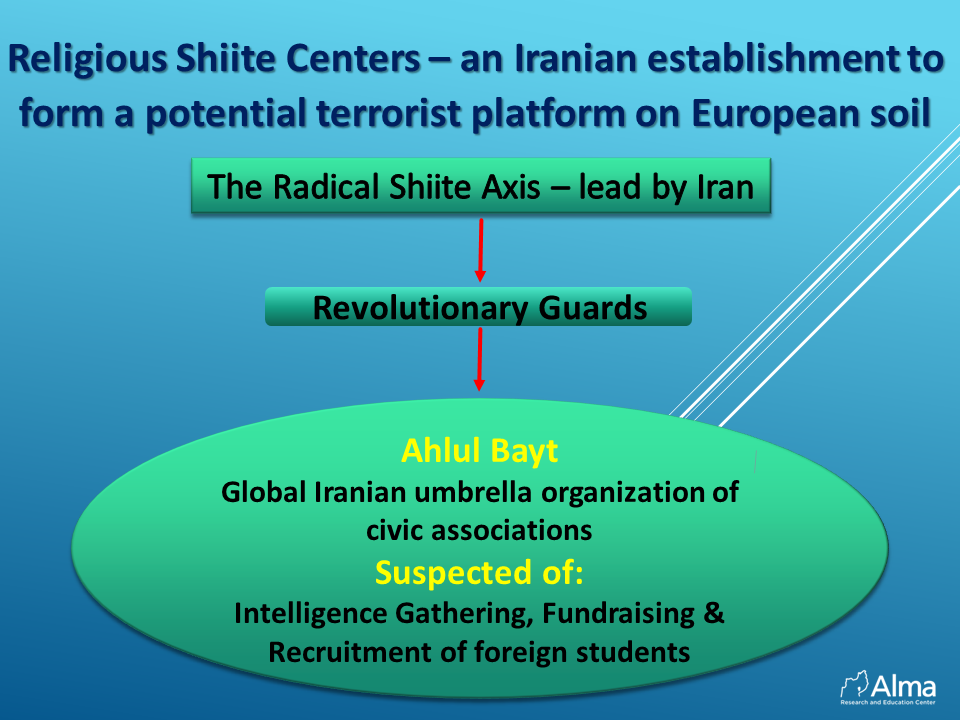
The Germans noted that since the mosque in Hamburg operates as an Iranian branch, Denmark should increase its supervision over the activities of the Grand Mosque in Copenhagen and what is happening in its territory. The suspicions are based on the thwarting of the operation to plant a bomb at a rally in Paris and the wave of arrests of Iranian intelligence personnel. At the time of the arrest of one of them – Asadollah Asadi, who was controlling the operation to plant the bomb, a notebook containing 289 entries, handwritten in Latin and Persian, was found in his car, detailing the amounts of money he had paid alongside various addresses in Europe. Among the entries were several people with common Iranian names who received cash from Assadi for operating expenses and even “financial assistance.” Some also signed the notebook to confirm payment. Through the notebook, researchers could link the information to Iranian activity in 11 different European countries, including the central address of the Islamic Center in Hamburg (IHZ), a Shiite Mosque association.
The Danish People’s Party and conservatives in the Copenhagen municipality had already warned that the mosque functions as an extended arm of the Iranians. The criticism intensified when reports in the Danish press showed Iran was behind constructing the city’s main mosque. Shi’ite Muslims comprise 10 to 20 percent of Denmark’s 260,000 Muslims. The construction of the Grand Mosque in Copenhagen exposed the mosque’s direct ties to the Ahl al-Bayt organization, especially Shi’ite clerics in Iran.[4] Religious institutions, especially smaller mosques, invite preachers as guests to give sermons that deal with instilling Shi’ite ideology and the need to protect its people without specifying the actions to be taken. One should not underestimate the influence of these preachers and their influence in Danish cities, among other things, through educational institutions and mosques.
Salman Rushdie’s attacker in August 2022 also had a Facebook account (his account has been frozen since the attack) with only a few dozen friends. One of them is the Imam of the Great Shi’ite Mosque in Copenhagen, Mohammad Khani, who has close ties with the Iranian regime.
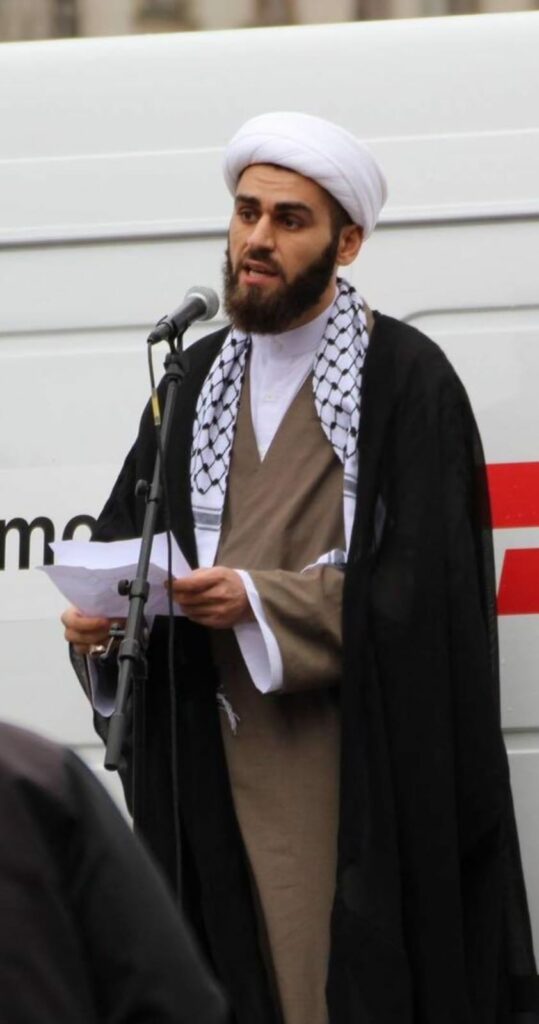
Khani, who denies that the mosque he heads operates under Iranian auspices, participated in a memorial ceremony for Qods Force commander Qasem Soleimani, who was assassinated by the Americans on January 3, 2020. The memorial ceremony was held about a week after the assassination in front of the City Hall of Copenhagen. Other patrons of the mosque participated and promoted memorial services for other Iranian “shaheeds.”[5]
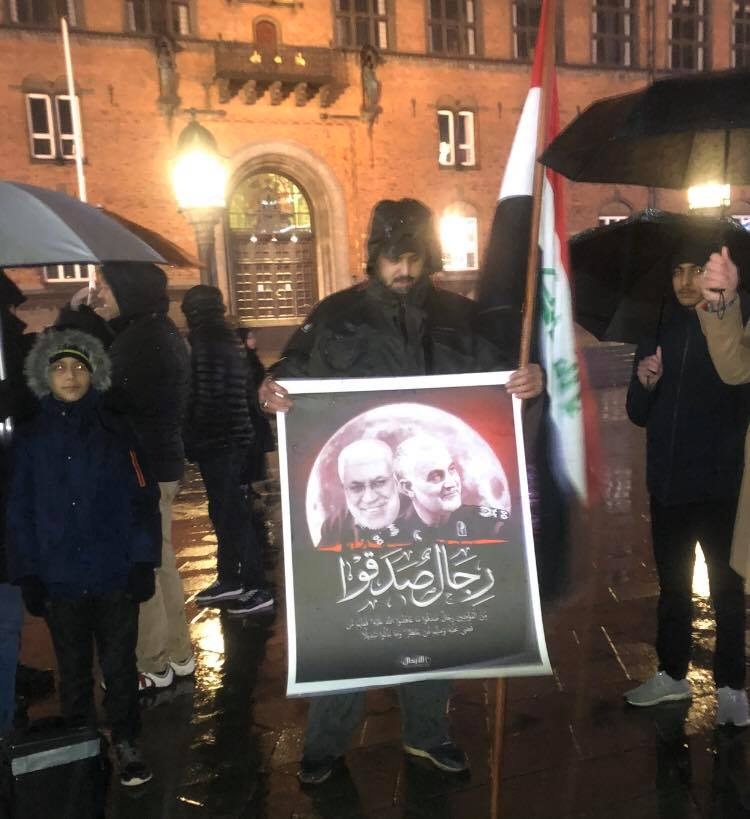
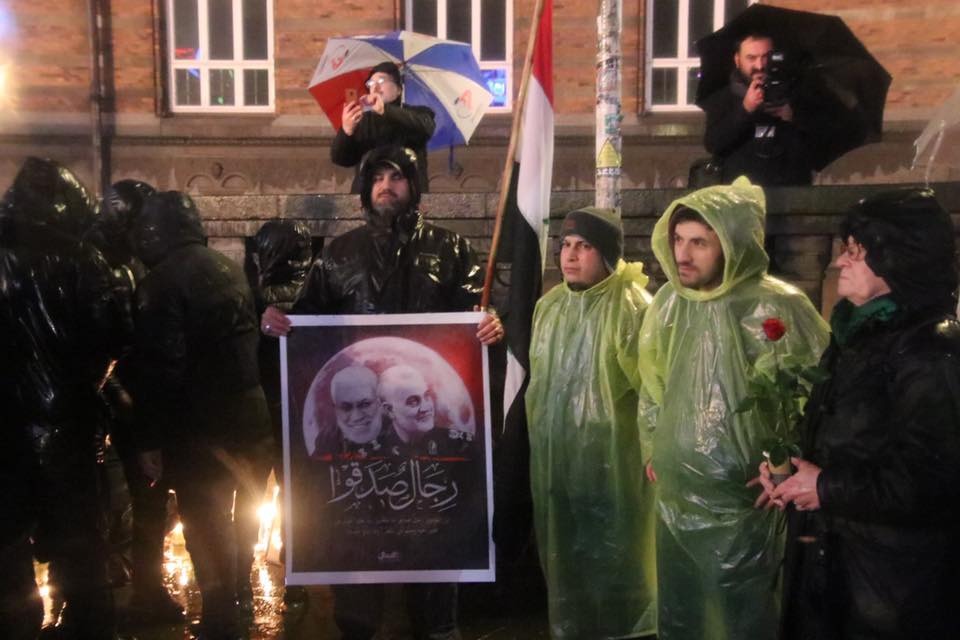
At the same time, other published documents indicate that Iran determines the identity of the mosque’s chairman in Copenhagen, and the fear of Iran’s control over the religious institution and the source of its activity is not coincidental. When Ahl al-Bayt, the body behind the construction of the mosque in Denmark, asked for recognition of its activities, it handed over documents stating that the organization operates under the supervision of Iran’s “Supreme Leader.” When the authorities reviewed and discovered the declaration, the association rushed to re-regulate the bylaws and removed the Supreme Leader’s name to obtain the Danish authorities’ approval.
Conclusion:
At the last annual conference (2022) of the Institute for Counter-Terrorism (ICT) at Reichman University, Mossad chief David Barnea revealed that the organization had thwarted dozens of Iranian terrorist attacks abroad and warned that a nuclear agreement would inject Iran with billions of dollars that would be channeled to terrorist activities around the world.
This special report indicates the level of risk and the ability of Iran and the Iranian proxies, especially Hezbollah, to operate throughout the Middle East and wherever they aspire to “export the Islamic revolution.”
The Scandinavian countries cooperate with European intelligence organizations and intelligence services outside Europe concerning anything related to thwarting terrorist activities in their territory and sharing information about hostile activity. At the same time, the success in eradicating the extensive Iranian intelligence and Hezbollah activity in Europe depends on the cooperation of the governments, the failure to turn a blind eye, and the practical denunciation of their actions.
Without an explicit and ongoing campaign against Iranian and Hezbollah activity, the likelihood of terrorist attacks against civilians and institutions on European soil, including in Scandinavia, will increase significantly. If the entrenchment and spreading of elements belonging to the radical Shiite axis led by Iran through civilian platforms increases, this will strengthen and intensify the hostile activity of the Shiite axis in Europe in the coming years. The result: exposure to danger to many civilians, including opponents of the Iranian regime, Jews and Israelis. It will also increase criminal activity and promote the trend of religious radicalization among minorities. A unified and cohesive European policy will thwart and deter Iran and Hezbollah.
[1]https://www.sakerhetspolisen.se/
[2]https://rib.msb.se/filer/pdf/28995.pdf
[3]https://www.wilsoncenter.org/article/us-sanctions-hezbollah-financier-and-network





